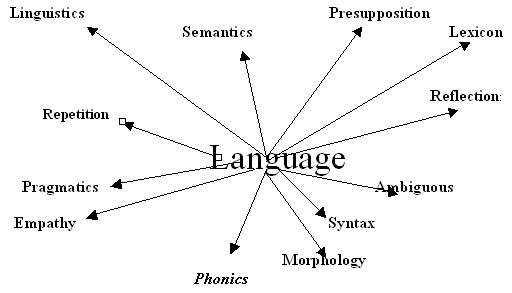
I’m recently interested by the idea that putting something into language—an idea, a person’s personality quirks, description of the streetscape—is a way to attack it, in the sense that it cuts the thing off, cuts it short.
It provides reasonable, definable limits around a thing, limits that are universal and no longer personal, even if the language is a poetic stretch; it is nonetheless language, which is limited.
There’s a violence in putting something into words, a kind of forced-fit struggle to make it literal, and therefore to kill it.
The idea that defining something by language is the death of that thing; there can only be suggestion, evocation, or a mysterious puzzle or riddle whose key is the idea. See Joel's post about
literal meaning, which includes this quote: "To define an expression is, paradoxically speaking, to explain how to get along without it." -W.V. Quine,
Quiddities, p. 43-44.
Somewhat related, I’ve also been thinking about language as a thing itself, specifically as a tool to express things, as a medium like painting. I find that I’m more interested, for example, in the way a sentence is made and the voice of a writer than what is being said. Like words are paint and can be made abstract. I find I’ll read something and afterwards, not recall any of it. But the experience of reading it was engaging and interesting. Language toes an interesting line, since it’s by nature conceptually representational (these symbols in a row mean this object, thing, concept), but not physically representation (the word tree does not look like an actual tree). It can be made into something abstract, not in the physical sense of lines on a paper (that would simply be drawing abstractly), but by the associations and evocations that can be made mixing and contrasting the concepts behind the actual words/language. “Abstract Writing” must always tied to literal reality. It will always operate through reference, never able to become the referent. And once the referent becomes language, it is dead.
This probably makes no sense.
 I’m recently interested by the idea that putting something into language—an idea, a person’s personality quirks, description of the streetscape—is a way to attack it, in the sense that it cuts the thing off, cuts it short. It provides reasonable, definable limits around a thing, limits that are universal and no longer personal, even if the language is a poetic stretch; it is nonetheless language, which is limited. There’s a violence in putting something into words, a kind of forced-fit struggle to make it literal, and therefore to kill it. The idea that defining something by language is the death of that thing; there can only be suggestion, evocation, or a mysterious puzzle or riddle whose key is the idea. See Joel's post about literal meaning, which includes this quote: "To define an expression is, paradoxically speaking, to explain how to get along without it." -W.V. Quine, Quiddities, p. 43-44.
I’m recently interested by the idea that putting something into language—an idea, a person’s personality quirks, description of the streetscape—is a way to attack it, in the sense that it cuts the thing off, cuts it short. It provides reasonable, definable limits around a thing, limits that are universal and no longer personal, even if the language is a poetic stretch; it is nonetheless language, which is limited. There’s a violence in putting something into words, a kind of forced-fit struggle to make it literal, and therefore to kill it. The idea that defining something by language is the death of that thing; there can only be suggestion, evocation, or a mysterious puzzle or riddle whose key is the idea. See Joel's post about literal meaning, which includes this quote: "To define an expression is, paradoxically speaking, to explain how to get along without it." -W.V. Quine, Quiddities, p. 43-44.
Makes a lot of sense to me. Congratulations! You have just killed death (conceptually). I think this means that you have invented poetry, or that you are about to as soon as you have had enough beer. Language (thought)is always old, fixed, and life is new and changing - it's the running water in a bucket thing again, only different?
Bob, you make an interesting point when you said, "Language (thought) is always old, fixed, and life is new and changing." That's exactly what I was thinking about language when I read this. I would disagree with you about thought though.
We have snap shot memories of thought that are old, fixed, and for all intents and purposes dead, but thought itself is dynamic and always changing.
So far our language is static as it is slavishly linked to the past. This post got me thinking of what a true language of relativity would look like. Would it even be possible to build a language that is flexible and dynamic enough to come alive and change within a relativistic framework? Or would that language then cease to fullfill it's primary role as a means of communication?
I guess these questions could possibly be addressed in terms of meaning, and our constant futile struggle to pin down exact meanings for the words. When it comes down to it, we pin down those words like butterfly specimens so that we can try and understand each other, yet when we use the words for ourselves it seems we let them dance and fly on the wind.
Maybe the language only appears dead as we hand the words back and forth, but comes alive when they are in our sole possession.
I don't know.
"I find I’ll read something and afterwards, not recall any of it. But the experience of reading it was engaging and interesting."
I always thought this was becuase I had a short attention span, but I'm glad to see it happens to others.